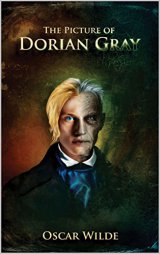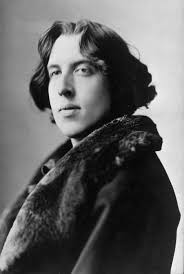The Picture of Dorian Gray Page #52
The Picture of Dorian Gray is a Gothic and philosophical novel by Oscar Wilde, first published complete in the July 1890 issue of Lippincott's Monthly Magazine. Fearing the story was indecent, prior to publication the magazine's editor deleted roughly five hundred words without Wilde's knowledge.
He hesitated for some moments, with a strangely immobile smile upon his face. Then shivering, though the atmosphere of the room was terribly hot, he drew himself up and glanced at the clock. It was twenty minutes to twelve. He put the box back, shutting the cabinet doors as he did so, and went into his bedroom. As midnight was striking bronze blows upon the dusky air, Dorian Gray, dressed commonly, and with a muffler wrapped round his throat, crept quietly out of his house. In Bond Street he found a hansom with a good horse. He hailed it and in a low voice gave the driver an address. The man shook his head. "It is too far for me," he muttered. "Here is a sovereign for you," said Dorian. "You shall have another if you drive fast." "All right, sir," answered the man, "you will be there in an hour," and after his fare had got in he turned his horse round and drove rapidly towards the river. CHAPTER 16 A cold rain began to fall, and the blurred street-lamps looked ghastly in the dripping mist. The public-houses were just closing, and dim men and women were clustering in broken groups round their doors. From some of the bars came the sound of horrible laughter. In others, drunkards brawled and screamed. Lying back in the hansom, with his hat pulled over his forehead, Dorian Gray watched with listless eyes the sordid shame of the great city, and now and then he repeated to himself the words that Lord Henry had said to him on the first day they had met, "To cure the soul by means of the senses, and the senses by means of the soul." Yes, that was the secret. He had often tried it, and would try it again now. There were opium dens where one could buy oblivion, dens of horror where the memory of old sins could be destroyed by the madness of sins that were new. The moon hung low in the sky like a yellow skull. From time to time a huge misshapen cloud stretched a long arm across and hid it. The gas-lamps grew fewer, and the streets more narrow and gloomy. Once the man lost his way and had to drive back half a mile. A steam rose from the horse as it splashed up the puddles. The sidewindows of the hansom were clogged with a grey-flannel mist. "To cure the soul by means of the senses, and the senses by means of the soul!" How the words rang in his ears! His soul, certainly, was sick to death. Was it true that the senses could cure it? Innocent blood had been spilled. What could atone for that? Ah! for that there was no atonement; but though forgiveness was impossible, forgetfulness was possible still, and he was determined to forget, to stamp the thing out, to crush it as one would crush the adder that had stung one. Indeed, what right had Basil to have spoken to him as he had done? Who had made him a judge over others? He had said things that were dreadful, horrible, not to be endured. On and on plodded the hansom, going slower, it seemed to him, at each step. He thrust up the trap and called to the man to drive faster. The hideous hunger for opium began to gnaw at him. His throat burned and his delicate hands twitched nervously together. He struck at the horse madly with his stick. The driver laughed and whipped up. He laughed in answer, and the man was silent. The way seemed interminable, and the streets like the black web of some sprawling spider. The monotony became unbearable, and as the mist thickened, he felt afraid. Then they passed by lonely brickfields. The fog was lighter here, and he could see the strange, bottle-shaped kilns with their orange, fanlike tongues of fire. A dog barked as they went by, and far away in the darkness some wandering sea-gull screamed. The horse stumbled in a rut, then swerved aside and broke into a gallop. After some time they left the clay road and rattled again over rough-paven streets. Most of the windows were dark, but now and then fantastic shadows were silhouetted against some lamplit blind. He watched them curiously. They moved like monstrous marionettes and made gestures like live things. He hated them. A dull rage was in his heart. As they turned a corner, a woman yelled something at them from an open door, and two men ran after the hansom for about a hundred yards. The driver beat at them with his whip. It is said that passion makes one think in a circle. Certainly with hideous iteration the bitten lips of Dorian Gray shaped and reshaped those subtle words that dealt with soul and sense, till he had found in them the full expression, as it were, of his mood, and justified, by intellectual approval, passions that without such justification would still have dominated his temper. From cell to cell of his brain crept the one thought; and the wild desire to live, most terrible of all man's appetites, quickened into force each trembling nerve and fibre. Ugliness that had once been hateful to him because it made things real, became dear to him now for that very reason. Ugliness was the one reality. The coarse brawl, the loathsome den, the crude violence of disordered life, the very vileness of thief and outcast, were more vivid, in their intense actuality of impression, than all the gracious shapes of art, the dreamy shadows of song. They were what he needed for forgetfulness. In three days he would be free. Suddenly the man drew up with a jerk at the top of a dark lane. Over the low roofs and jagged chimney-stacks of the houses rose the black masts of ships. Wreaths of white mist clung like ghostly sails to the yards. "Somewhere about here, sir, ain't it?" he asked huskily through the trap. Dorian started and peered round. "This will do," he answered, and having got out hastily and given the driver the extra fare he had promised him, he walked quickly in the direction of the quay. Here and there a lantern gleamed at the stern of some huge merchantman. The light shook and splintered in the puddles. A red glare came from an outward-bound steamer that was coaling. The slimy pavement looked like a wet mackintosh. He hurried on towards the left, glancing back now and then to see if he was being followed. In about seven or eight minutes he reached a small shabby house that was wedged in between two gaunt factories. In one of the top-windows stood a lamp. He stopped and gave a peculiar knock.
Translation
Translate and read this book in other languages:
Select another language:
- - Select -
- 简体中文 (Chinese - Simplified)
- 繁體中文 (Chinese - Traditional)
- Español (Spanish)
- Esperanto (Esperanto)
- 日本語 (Japanese)
- Português (Portuguese)
- Deutsch (German)
- العربية (Arabic)
- Français (French)
- Русский (Russian)
- ಕನ್ನಡ (Kannada)
- 한국어 (Korean)
- עברית (Hebrew)
- Gaeilge (Irish)
- Українська (Ukrainian)
- اردو (Urdu)
- Magyar (Hungarian)
- मानक हिन्दी (Hindi)
- Indonesia (Indonesian)
- Italiano (Italian)
- தமிழ் (Tamil)
- Türkçe (Turkish)
- తెలుగు (Telugu)
- ภาษาไทย (Thai)
- Tiếng Việt (Vietnamese)
- Čeština (Czech)
- Polski (Polish)
- Bahasa Indonesia (Indonesian)
- Românește (Romanian)
- Nederlands (Dutch)
- Ελληνικά (Greek)
- Latinum (Latin)
- Svenska (Swedish)
- Dansk (Danish)
- Suomi (Finnish)
- فارسی (Persian)
- ייִדיש (Yiddish)
- հայերեն (Armenian)
- Norsk (Norwegian)
- English (English)
Citation
Use the citation below to add this book to your bibliography:
Style:MLAChicagoAPA
"The Picture of Dorian Gray Books." Literature.com. STANDS4 LLC, 2024. Web. 28 Nov. 2024. <https://www.literature.com/book/the_picture_of_dorian_gray_869>.




Discuss this The Picture of Dorian Gray book with the community:
Report Comment
We're doing our best to make sure our content is useful, accurate and safe.
If by any chance you spot an inappropriate comment while navigating through our website please use this form to let us know, and we'll take care of it shortly.
Attachment
You need to be logged in to favorite.
Log In